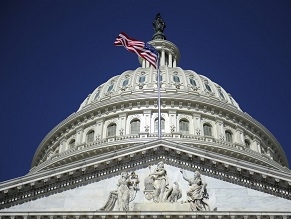|
World Jewish News

United States Capitol building in Washington, DC.. (photo credit:REUTERS)
|
White House says new Iran bill grants Congress 'proper role' in nuclear talks
15.04.2015, Israel and the World The Obama administration is embracing a compromise reached on Capitol Hill that will grant Congress review powers over an agreement with Iran over its nuclear program.
Explaining US President Barack Obama's decision on Tuesday to back away from his threats to veto any and all legislation on Iran during the negotiating period, White House spokesperson Eric Schultz said that "significant steps" had been taken by Republican members to make the bill a bipartisan measure.
The legislation, formally titled the Iran Nuclear Agreement Review Act of 2015, now grants "legitimate congressional oversight" to lawmakers, Schultz said aboard Air Force One on Wednesday afternoon.
If passed, the law would require the president to submit any agreement to Congress in its entirety within days of its signing, allowing Congress to review the deal and— should its leadership choose to do so— vote to approve or disapprove of congressional participation in the deal.
Should Congress choose to hold such a vote, and should it vote to disapprove of the agreement, the president could veto the resolution. Congress would have to then pass the resolution a second time with a two-thirds majority.
The revised version of the bill "gives our negotiators the time and space they need to finalize this agreement by the end of June," he added.
Outside of the provision allowing for a vote, Congress will receive regular, timely updates certifying Iran's compliance to the deal by the president. Its
The bill's author, committee chairman Bob Corker (R-Tennessee), characterized the bill as an architecture for Congress to oversee any future agreement. In order to secure bipartisan support, several provisions were scrapped, including demands that the president certify Iran has ceased its endorsement of terrorism worldwide, and that Tehran recognize the state of Israel as part of a nuclear accord.
The White House has long opposed legislation on Iran during the nuclear talks, warning that any movements by Congress may derail the effort. Congressional leadership has repeatedly delayed committee hearings, debates and votes on various pieces of legislation in order to appease the administration.
Corker said the White House only changed its position this week because of the growing number of Democrats joining his ranks in favor of the bill.
“He and Senator Cardin did a terrific job of working together and listening and in the end compromising,” Valerie Jarrett, a senior White House advisor, said on Wednesday. “So it’s not ideal, obviously, but we want to move forward.”
In Israel, Strategic Affairs Minister Yuval Steinitz [Likud] said he was pleased by the compromise.
“We are certainly pleased this morning,” he said, adding that he saw it as “an achievement for Israel.”
Prime Minister Benjamin Netanyahu’s address to a joint session of Congress last month “had a decisive influence,” he said. He argued that the legislation could play an important role in preventing the ratification of a bad agreement or at the very least it will likely make it a more reasonable deal.
But the bill would not halt Israel’s campaign against the terms of the deal as they were laid out in the framework agreement.
Both Netanyahu and Defense Minister Moshe Ya’alon spoke against it at ceremonies to commemorate the death of six million Jews in the Holocaust at the Yad Vashem museum in Jerusalem.
Iran responded to the development on Capitol Hill with caution, noting that the negotiations were between Tehran and the Obama administration, and not with 535 members of Congress.
"Our path is that of moderation, engagement, dialogue, logic and standing up for Iranian people's rights," Iranian President Hassan Rouhani said on Twitter on Wednesday. "Our counterpart is not US Senate or Congress; it's P5+1."
The permanent five members of the United Nations Security Council and Germany, known as the P5+1, announced a political framework for a nuclear agreement in Lausanne, Switzerland earlier this month. They seek to reach a final accord by June 30.
But significant gaps remain between the parties on the issue of sanctions, research and development— issues which the parties had hoped to bridge by the end of March.
In a speech broadcast live across Iran earlier in the day, Rouhani, considered a pragmatist relative to Tehran's political spectrum, repeated the country's demand that sanctions be lifted with the signing of a comprehensive nuclear agreement.
"If there is no end to sanctions, there will not be an agreement," Rouhani said in the northern Iranian city of Rasht, echoing remarks made last week by Iran's most powerful authority, Supreme Leader Ayatollah Ali Khamenei. "The end of these negotiations and a signed deal must include a declaration of cancelling the oppressive sanctions on the great nation of Iran."
By MICHAEL WILNER. Tovah Lazaroff contributed to this report.
JPost.com
|
|
